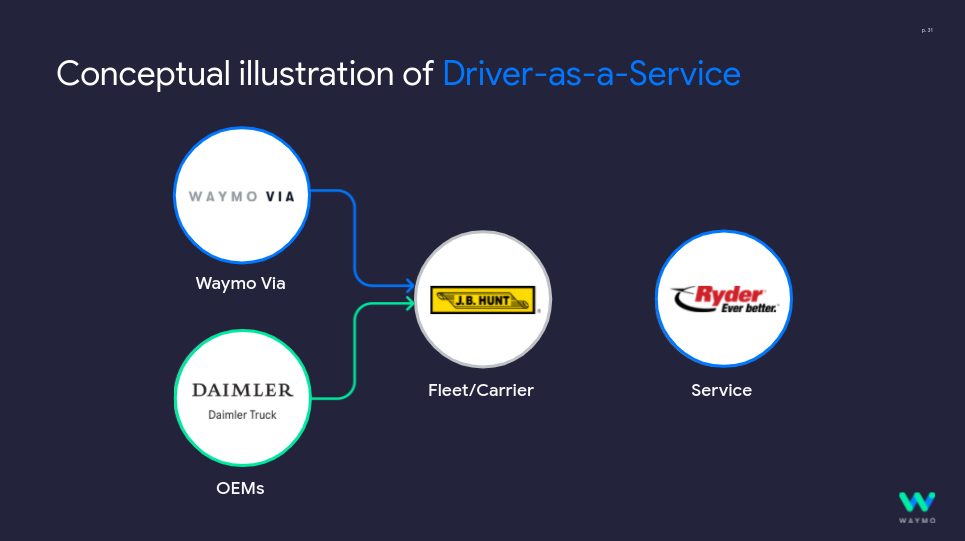Waymo Via, the autonomous vehicle company’s trucking and cargo transportation unit, is expanding its existing partnership with logistics company J.B. Hunt Transport Services from a pilot into a long-term strategic alliance.
As part of the agreement, J.B. Hunt will be Waymo Via’s first launch customer for fully autonomous, driverless freight routes, which Waymo expects to reach within the next few years.
Waymo and J.B. Hunt began a “test run” in 2021 along I-45 between Houston and Fort Worth, Texas, one of the country’s busiest trade corridors. Waymo’s Daimler trucks, powered by the Waymo Driver autonomous platform, delivered 862,179 pounds of freight by the end of the pilot, with no crashes or speeding events, 100% on-time pickup and delivery and 100% freight intact, according to the company. Each of the runs were completed with a commercially licensed truck driver and a software technician onboard to monitor operations.
“Our pilot last year with Waymo Via really helped us get a hands-on understanding of how autonomous driving technology could be implemented within our operations,” said Craig Harper, chief sustainability officer and executive vice president at J.B. Hunt, in a statement. “This strategic alliance will continue that momentum and further explore the intricate details that would make this a value-driven solution for customers.”

Image Credits: Waymo
In 2022 and beyond, the companies intend to launch several more pilots along the same corridor in Texas to prepare for driverless autonomous operations.
Waymo did not share what specific goals it hopes to achieve for its next pilot with J.B. Hunt, other than to firm up the company’s driver-as-a-service model, which involves Waymo partnering with an OEM like Daimler to build autonomous trucks equipped with the Waymo Driver. Those trucks will be purchased directly from fleets or carriers, like J.B. Hunt and serviced by partners like Ryder.
“That’s the long-term vision,” Julianne McGoldrick, a Waymo spokesperson, told TechCrunch. “In the interim as we scale up to that vision, we have our test fleet of trucks, and the pilots that we’ll do with those and with our autonomous specialists are really to gain that operational practice so that when we do reach fully autonomous operations, we have all the foundations in place to haul freight with no human driver for J.B. Hunt and customers like them.”
Over the course of the Waymo-J.B. Hunt partnership, the two companies also plan to conduct joint operational and market studies to learn more about their collective progress using self-driving trucks, as well as explore a technology integration with J.B. Hunt 360, the company’s digital freight matching platform.
Of course, Waymo isn’t the only self-driving truck on the roads in Texas, or elsewhere. One of Waymo Via’s competitors, TuSimple, recently completed its first driverless autonomous trucking run, which effectively puts its tech at a more progressive milestone. Aurora and Kodiak Robotics are also testing and carrying freight in Texas.
That doesn’t worry Waymo — the Alphabet-owned strategy is linked more tightly with its partners than with ticking off autonomous boxes, McGoldrick says.
“I think what we’ve seen is a lot of partnerships or collaborations in the industry have been primarily centered around one-off trial runs or one-off pilots, and there hasn’t been much meat to them,” she said. “We’re entering this multi-year deal with multiple components that really cover everything and show that we’re going really deep with our partners, as opposed to just doing a pilot for pilot’s sake. We’re really crafting what our fully autonomous launch will look like together with our partners so that it’s as successful as possible when we’re ready.”















 English (US) ·
English (US) ·